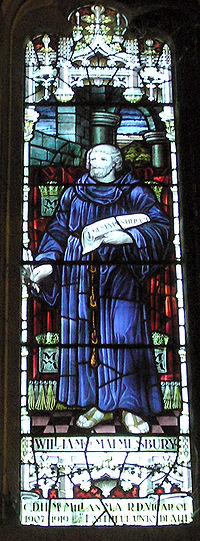William of Malmesbury

William of Malmesbury (* around 1080/1095 in Wiltshire ; † around 1143) was an English historian, son of a Norman and an Englishwoman, and a monk at Malmesbury Abbey .
biography
Wilhelm's upbringing at Malmesbury Abbey also superficially included logic and physics , but primarily he devoted himself to moral philosophy and above all to history . He compiled a collection of medieval tales and wrote a popular account of English history based on the Historia ecclesiastica gentis Anglorum ( Church history of the English people ) by Bede .
As a continuation, around 1120 he wrote the Gesta regum Anglorum , the deeds of the English kings (449–1127), which is now considered by modern scholars to be one of the great works of English historiography. The work also includes a description of an early attempt to fly by his monk brother Eilmer of Malmesbury , which is considered historical.
It was followed in 1125 by the Gesta pontificum Anglorum ( deeds of the English bishops ). Then Wilhelm wrote on theological subjects. He dedicated a revision of the Gesta regum anglorum from 1127 to Count Robert of Gloucester .
William made the acquaintance of Bishop Roger of Salisbury , who had a castle in Malmesbury, because of which he was offered the Malmesbury Abbey in 1140; Wilhelm refused and preferred to remain a scholar. He had his only public appearance in 1141 at the Council of Winchester , at which the clergy sided with the Empress Mathilde . At this time he wrote the Historia Novella ( New History (1128–1142)), in which he reports on the events since 1125, including the anarchy under King Stephen . This work ends abruptly at the end of 1142 and the unfulfilled promise of a continuation - Wilhelm probably died before he could resume work.
meaning
William of Malmesbury is considered one of the finest English historians of his day. John Milton expressed the opinion that he was by far the best writer of all ("by far the best writer of all") chroniclers of the 12th century in both style and judgment ("both for style and judgment"). A strong Latin stylist with literary and historiographical instinct and - for his time - remarkable sound. He is an authority of considerable value from 1066 onwards; many anecdotes and astute judgments about people and events can be found in his works.
Works
- Gesta Regum Anglorum , Volume I, edited and translated by Roger AB Mynors . Oxford University Press, Oxford 1998, ISBN 0-19-820678-X .
- Gesta Regum Anglorum , Volume II: General Introduction and Commentary , RM Thomson and M. Winterbottom. Oxford University Press, Oxford 1999, ISBN 0-19-820682-8 .
- Saints' Lives , edited by M. Winterbottom and RM Thomson. Oxford University Press, Oxford 2002, ISBN 0-19-820709-3 .
- Historia Novella , edited by Edmund King, translated by KR Potter. Oxford University Press, Oxford 1999, ISBN 0-19-820192-3 .
- Chronicle of the Kings of England , translation by Rev. John Sharpe, 1815, JA Giles (ed.). George Bell and Sons, London 1904 ( archive.org ).
- The Deeds of the Bishops of England [Gesta Pontificum Anglorum] , translated by David Preest. Boydell Press, Woodbridge 2002, ISBN 0-85115-884-6 .
literature
- Rodney M. Thomson, Emily Dolmans, Emily A. Winkler: Discovering William of Malmesbury . Boydell & Brewer, Woodbridge 2020, ISBN 978-1-78327-536-6 .
Web links
- Latin chroniclers from the 11th to 13th centuries: William of Malmesbury from The Cambridge History of English and American Literature , Volume I, 1907-21.
- Deeds of the English Kings , excerpts.
- Battle of Hastings, 1066 , excerpts.
- Report on the Battle of Lincoln 1142 , excerpts.
Individual evidence
- ↑ Lynn White: Eilmer of Malmesbury, an Eleventh Century Aviator: A Case Study of Technological Innovation, Its Context and Tradition In: Technology and Culture , Vol. 2, No. 2 (1961), pp. 97-111 (97-99 ), doi: 10.2307 / 3101411 .
| personal data | |
|---|---|
| SURNAME | William of Malmesbury |
| BRIEF DESCRIPTION | English historian |
| DATE OF BIRTH | between 1080 and 1095 |
| PLACE OF BIRTH | Wiltshire |
| DATE OF DEATH | around 1143 |
